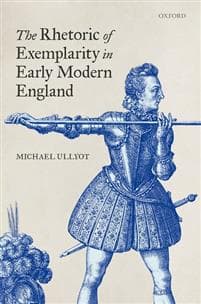
The Rhetoric of Exemplarity in Early Modern England
1 121 kr
1 121 kr
På lager
On., 30 april - ti., 6 mai
Sikker betaling
14 dagers åpent kjøp
Selges og leveres av
Adlibris
Produktbeskrivelse
In this study, Michael Ullyot makes two new arguments about the rhetoric of exemplarity in late Elizabethan and Jacobean culture: first, that exemplarity is a recursive cycle driven by rhetoricians' words and readers' actions; and second, that positive moral examples are not replicable, but rather aspirational models of readers' posthumous biographies. For example, Alexander the Great envied Achilles less for his exemplary life than for Homer's account of it. Ullyot defines the three types of decorum on which exemplary rhetoric and imitation rely, and charts their operations through Philip Sidney's poetics, Edmund Spenser's poetry, and the dedications, sermons, elegies, biographies, and other occasional texts about Robert Devereux, second earl of Essex, and Henry, Prince of Wales. Ullyot expands the definition of occasional texts to include those that criticize their circumstances to demand better ones, and historicizes moral exemplarity in the contexts of sixteenth-century Protestant memory and humanist pedagogy. The Rhetoric of Exemplarity in Early Modern England concludes that all exemplary subjects suffer from the problem of metonymy, the objection that their chosen excerpts misrepresent their missing parts. This problem also besets historicist literary criticism, ever subject to corrections from the archive, so this study concedes that its own rhetorical methods are exemplary.
Artikkel nr.
0478432f-2cea-4104-b097-1d8334e77618
The Rhetoric of Exemplarity in Early Modern England
1 121 kr
1 121 kr
På lager
On., 30 april - ti., 6 mai
Sikker betaling
14 dagers åpent kjøp
Selges og leveres av
Adlibris
Lignende toppselgere

Generic
Øreputer for Bose QuietComfort - QC35/QC25/QC15/AE2 Hodetelefoner Svart
99 kr
4,5
tirsdag, 29 april

Vileda
Microfiberklud PVAmicro 38x35cm grøn,5 stk/pk
302 kr
fredag, 25 april

Bigstren
Luftrenseenhet - Renser / Saniterer luften - 20,000 mg/h
599 kr
4,3
tirsdag, 29 april

Generic
4-Pak - Tesla Senterkopper - Bil Svart/silver
129 kr
4,5
tirsdag, 29 april

-2 %
Generic
Trådløs CarPlay-adapter 2025
449 kr
Tidligere laveste pris:
459 kr
4,4
tirsdag, 29 april

Gardlov
Plenlufter - Piggsko for å lufte plenen
269 kr
4,0
tirsdag, 29 april

Generic
Hundetrimmer / Potetrimmer - Trimmer for Poter
199 kr
4,3
tirsdag, 29 april

-23 %
Generic
Silikontape / Plaster for Arr – Behandling av arr
99 kr
Tidligere laveste pris:
129 kr
tirsdag, 29 april

Generic
RCA til HDMI Converter 1080p - Adapter
139 kr
4,5
tirsdag, 29 april

Generic
3-Pak - Fidget Spinners med Sugekopp for Barn
179 kr
4,6
tirsdag, 29 april
Anbefalinger til dig

Price Point
Universallader for Garmin klokker Svart
89 kr
4,2
mandag, 28 april

INF
INF Filter for MSPA oppblåsbare bassenger FD2089 4-pakning
299 kr
4,7
fredag, 25 april

Generic
Munnspill - C-durskala
99 kr
3,7
tirsdag, 29 april

INF
INF Øreputer for Bose QC35 I/II, QC25, QC15, QC 2 AE 2, AE 2i, AE 2w, SoundTrue, SoundLink
99 kr
4,6
mandag, 28 april

-9 %
INF
INF TYPE-C Dual SD/TF-kortleser for rask dataoverføring 0
107 kr
Tidligere laveste pris:
118 kr
3,3
mandag, 28 april

Generic
2-Pak - Lader for iPhone - Hurtiglader - Adapter + Kabel 20W USB-C
199 kr
3,7
tirsdag, 29 april

INF
Ankelstropp for styrketrening med kabelmaskiner 2 Pack
152 kr
4,5
mandag, 28 april

Sero
SERO Apple Macbook magsafe 2 lader, 60W - for Macbook Pro 13" m. Retina skjerm
349 kr
4,2
torsdag, 24 april

Generic
4-Pak - BMW Senterkopper - Bil 68 mm
129 kr
4,3
tirsdag, 29 april

Generic
4-Pak - Volkswagen VW Senterkopper - Bil 65 mm
129 kr
4,1
tirsdag, 29 april